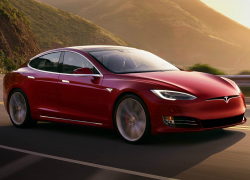— A Tesla used car warranty lawsuit alleges pre-owned Model S and Model X warranties aren't much good, especially when it comes to the batteries.
The following 2012-present models are included in the proposed used car class action lawsuit.
- Tesla Model S 60
- Tesla Model S P85+
- Tesla Model S 60D
- Tesla Model S 85
- Tesla Model S 90D
- Tesla Model S 75
- Tesla Model S P85
- Tesla Model S 85D
- Tesla Model S 70
- Tesla Model S 90D
- Tesla Model S P90D
- Tesla Model S 75D
- Tesla Model S 90 (2015)
- Tesla Model S P85D
- Tesla Model S 70D
- Tesla Model S P100D
- Tesla Model S 100D
- Tesla Model X 60D
- Tesla Model X 70D
- Tesla Model X 75D
- Tesla Model X 90D
- Tesla Model X P90D
- Tesla Model X 100D
- Tesla Model X P100D
The lawsuit says Tesla has been selling used vehicles since April 2015 and more than 13,000 used Tesla Model S and Model X vehicles have been sold to customers nationwide.
But the plaintiff says even though the vehicles allegedly go through a certified pre-owned inspection, the automaker doesn't provide any type of checklist or written report to disclose the findings of the alleged inspections.
In the case of the plaintiff, he claims he wrongly believed Tesla's advertising concerning the capacity of the battery and never received a report about an inspection of the battery.
The plaintiff says he paid more than $40,000 for the Model S which was delivered in November 2017, but he says he was never provided a checklist of components that were inspected.
However, plaintiff Hugh Nguyen says he believed the car would get about 200 miles per full charge at 100% battery capacity, close to the 210-mile EPA rating displayed on Tesla’s website.
After taking delivery of the vehicle, he drove his Model S home and allegedly learned for the first time after charging his car’s battery to 100% that the maximum rated range was only 166 miles. The plaintiff says he drove and charged the car to 100% battery capacity several times, yet still received approximately 165-166 miles each time.
In December 2017, Nguyen brought his car to Tesla and again informed them of the battery issue. The plaintiff claims Tesla made a correction to the “Battery Management System (BMS) (HV Battery 1.0/1.5)” which did not fix the problems.
The plaintiff was allegedly told to report back to the service center after driving around with the car and “cycling” the battery, which refers to charging the battery to 100% and discharging it to low levels to recalibrate the battery.
Mr. Nguyen says he brought the Model S to Tesla five times between December 2017 and July 2018 where the battery was tested and inspected, but the plaintiff says technicians never could repair the problems.
According to the plaintiff, "Tesla has blatantly refused to provide Plaintiff with a proper remedy as warrantied and continues to fraudulently deceive consumers like Plaintiff."
The lawsuit alleges Tesla's technicians attempted to downplay the battery problems and incorrectly noted the Model S battery showed 166-rated miles at 90% battery charge.
"This number is blatantly incorrect, and Tesla has fraudulently attempted to cover this up subsequently as evident in later versions of the repair invoicing. If this mistake were to be taken out in a different context, then it could be said that Tesla’s mistake here was unintentional. However, Tesla relied upon this incorrect calculation and proffered the information during a later arbitration between Plaintiff and Tesla on the same battery issue."
Finally the situation went to arbitration between the plaintiff and Tesla, but the lawsuit says Tesla lied by saying the Model S was experiencing "normal battery degradation."
The plaintiff claims technicians incorrectly indicated the car was only suffering from 11% degradation because technicians failed to record the correct numbers, as the car was only charging up to 165/166 miles at 100% battery capacity.
"Tesla blatantly lied and made the fraudulent representation that the battery was charging up to 165/166 miles at 90%. If it weren’t for Tesla’s fraudulent motives, concealment and deceptive behavior, the true battery degradation of 24%, not 11%, would have been noted by Tesla."
According to the lawsuit, Tesla won the arbitration case because the arbitrator based the decision on false and misleading statements made by Tesla.
"Despite the fact that Tesla warrantied Plaintiff’s vehicle with a 2-year, 100,000 mile limited warranty, and the fact that it provided a 8-year, unlimited mile battery warranty, Tesla has failed its duty to Plaintiff by unlawfully, improperly, and fraudulently denying proper service and repair of Plaintiff’s vehicle."
Buyers of fully inspected used Tesla vehicles allegedly learn Tesla's “best warranty and service program in the world” isn’t what it seems to be. According to the used car lawsuit, thousands of customers have been denied warranty coverage and frustrated by the seemingly endless delays and excuses given by Tesla.
By allegedly failing to provide used vehicle buyers with results of inspections, including about the batteries, Tesla allegedly violates "various state and federal consumer protection and warranty laws."
The plaintiff says consumers wrongly rely on Tesla’s warranties, which include a 4-year, 50,000-mile or 2-year, 100,000-mile warranty that covers a list of standard parts and defective items.
In addition, the lawsuit alleges Tesla offers an 8-year unlimited mile warranty for the Model S and Model X batteries, yet customers have allegedly been left with no choice but to pay out-of-pocket for repairs.
Documents from the lawsuit indicate Tesla should buy back the vehicles and refund any out-of-pocket costs associated with the used Tesla Model S and Model X vehicles.
The Tesla used car warranty lawsuit was filed in the U.S. District Court for the Central District of California - Hugh Nguyen, at al., v. Tesla Inc.
The plaintiff is represented by the Law Offices of Edward C. Chen.

